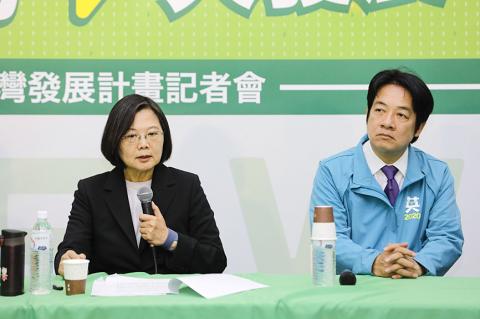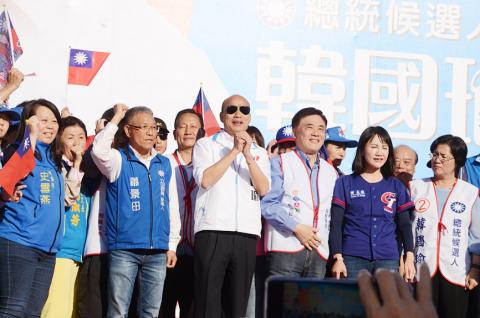President Tsai Ing-wen (蔡英文) yesterday unveiled the Great South, Great Development policy aimed at closing the development gap between southern Taiwan and other parts of the nation.
The policy would focus on the development of industry, agriculture, transportation and tourism in the south and set development goals, thereby demonstrating the Democratic Progressive Party’s (DPP) resolve to bring prosperity to the region, Tsai, who is seeking re-election as the DPP’s presidential candidate in the Jan. 11 election, told a news conference in Kaohsiung.
She was joined by her running mate, former premier William Lai (賴清德), as well as Presidential Office Secretary-General Chen Chu (陳菊), Vice Premier Chen Chi-mai (陳其邁) and DPP Kaohsiung City Councilor Kang Yu-cheng (康裕成), who heads Tsai’s campaign office in the southern city.

Photo: Ko Yu-hao, Taipei Times
Kaohsiung has transformed from an industrial city to a “marine capital,” Tsai said.
She expressed the hope that development levels in the north and south could be balanced with the help of the Executive Yuan’s Forward-looking Infrastructure Development Program, saying that the process must be accelerated.
Although the DPP lost the Kaohsiung mayoral election on Nov. 24 last year, it would not renege on its promise to the city just because there has been a transition of political power, as Kaohsiung has not wronged anyone, she said.

Photo: Yen Hung-chun, Taipei Times
Under the policy, Yunlin County would become the nation’s hub for farming machinery and value-added agricultural and silk products, while Chiayi County would become the headquarters of Taiwan’s tourism, cultural and creative industries, precision machinery and seafood processing.
The policy aims for Tainan to become a high-tech city, while Kaohsiung would become a center of international finance, materials science, marine technologies and circular economy.
Under the policy, Pingtung would focus on the development of agricultural biotechnology, tourism and renewable energy, while outlying Penghu County would set its sights on culture and tourism.
Lai said that the plan would not only balance development in the north and south, promoting unity among Taiwanese, but also solve the problem of “northbound drifting” — a term that refers to people leaving their hometowns in the south to look for work in the north.
Separately yesterday, Kaohsiung Mayor Han Kuo-yu (韓國瑜), the Chinese Nationalist Party’s (KMT) presidential candidate, attended a campaign rally at the Yunlin County Stadium to celebrate the launch of a joint campaign headquarters for him and the county’s KMT legislative candidates.
It was the second time since Thursday that Han visited the county, sparking speculation that he wants to curry favor with local peanut farmers as prices of the legumes are plummeting.
A rumor that began circulating on the Internet last month that the DPP administration plans to import peanuts has driven wholesale peanut prices down from at least NT$40 per kilogram to less than NT$30.
Tsai on Tuesday also visited Yunlin to learn about the peanut price situation.
In related news, a group of veterans who are KMT stalwarts yesterday rallied in Taipei, vowing to use their “expertise in political warfare” to monitor the election and ensure that it is not rigged against Han.
Retired general Chen Chen-hsiang (陳鎮湘), a former KMT vice chairman, called on people to support retired major general Wu Sz-huai (吳斯懷), a KMT legislator-at-large nominee, to prevent the party’s main base of support from “crumbling.”
Wu sparked controversy when he attended a 2016 event in China to commemorate the birth of Sun Yat-sen (孫中山), at which he reportedly listened to a speech by Chinese President Xi Jinping (習近平) and stood for a rendition of the Chinese national anthem.
Additional reporting by Chan Shih-hung and Shih Hsiao-kuang

A preclearance service to facilitate entry for people traveling to select airports in Japan would be available from Thursday next week to Feb. 25 at Taiwan Taoyuan International Airport, Taoyuan International Airport Corp (TIAC) said on Tuesday. The service was first made available to Taiwanese travelers throughout the winter vacation of 2024 and during the Lunar New Year holiday. In addition to flights to the Japanese cities of Hakodate, Asahikawa, Akita, Sendai, Niigata, Okayama, Takamatsu, Kumamoto and Kagoshima, the service would be available to travelers to Kobe and Oita. The service can be accessed by passengers of 15 flight routes operated by

MORE FALL: An investigation into one of Xi’s key cronies, part of a broader ‘anti-corruption’ drive, indicates that he might have a deep distrust in the military, an expert said China’s latest military purge underscores systemic risks in its shift from collective leadership to sole rule under Chinese President Xi Jinping (習近平), and could disrupt its chain of command and military capabilities, a national security official said yesterday. If decisionmaking within the Chinese Communist Party has become “irrational” under one-man rule, the Taiwan Strait and the regional situation must be approached with extreme caution, given unforeseen risks, they added. The anonymous official made the remarks as China’s Central Military Commission Vice Chairman Zhang Youxia (張又俠) and Joint Staff Department Chief of Staff Liu Zhenli (劉振立) were reportedly being investigated for suspected “serious

ENHANCING EFFICIENCY: The apron can accommodate 16 airplanes overnight at Taoyuan airport while work on the third runway continues, the transport minister said A new temporary overnight parking apron at Taiwan Taoyuan International Airport is to start operating on Friday next week to boost operational efficiency while the third runway is being constructed, the Ministry of Transportation and Communications said yesterday. The apron — one of the crucial projects in the construction of the third runway — can accommodate 16 aircraft overnight at the nation’s largest international airport, Minister of Transportation and Communications Chen Shih-kai (陳世凱) told reporters while inspecting the new facility yesterday morning. Aside from providing the airport operator with greater flexibility in aircraft parking during the third runway construction,

Taiwanese and US defense groups are collaborating to introduce deployable, semi-autonomous manufacturing systems for drones and components in a boost to the nation’s supply chain resilience. Taiwan’s G-Tech Optroelectronics Corp subsidiary GTOC and the US’ Aerkomm Inc on Friday announced an agreement with fellow US-based Firestorm Lab to adopt the latter’s xCell, a technology featuring 3D printers fitted in 6.1m container units. The systems enable aerial platforms and parts to be produced in high volumes from dispersed nodes capable of rapid redeployment, to minimize the risk of enemy strikes and to meet field requirements, they said. Firestorm chief technology officer Ian Muceus said